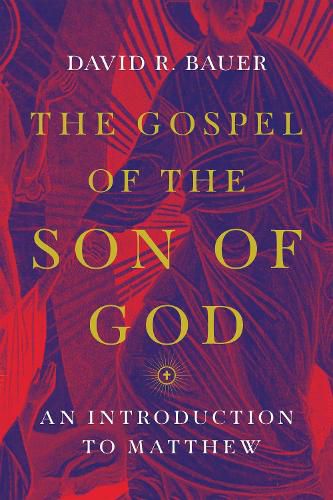Readings Newsletter
Become a Readings Member to make your shopping experience even easier.
Sign in or sign up for free!
You’re not far away from qualifying for FREE standard shipping within Australia
You’ve qualified for FREE standard shipping within Australia
The cart is loading…






From beginning to end, the very structure of the Gospel of Matthew emphasizes that Jesus is the Son of God. At climactic points Jesus is so identified-by Peter, by a Roman centurion, by Jesus himself, and by God the Father. With The Gospel of the Son of God, David Bauer provides a comprehensive introduction to this Gospel that has been so foundational to the Christian church. Arguing that the nature of Matthew itself should provide us with the framework for its study, he presents a holistic inductive approach with a literary, theological, and canonical focus. In the first section on orientation, Bauer explores issues of genre, interpretive methods, authorship, audience, and literary structure. Then he moves to interpretation, guiding readers through the meaning of sections of the text. Finally, the reflection section synthesizes and develops major theological themes emerging from the interpretation, including Christology, salvation history, eschatology, and discipleship. While providing a sound basis for the study of Matthew, Bauer goes beyond typical introductory issues to draw out the rich theological vision of the Gospel. His careful scholarship and clear exposition will make this a valuable resource for college and seminary students and pastors.
$9.00 standard shipping within Australia
FREE standard shipping within Australia for orders over $100.00
Express & International shipping calculated at checkout
From beginning to end, the very structure of the Gospel of Matthew emphasizes that Jesus is the Son of God. At climactic points Jesus is so identified-by Peter, by a Roman centurion, by Jesus himself, and by God the Father. With The Gospel of the Son of God, David Bauer provides a comprehensive introduction to this Gospel that has been so foundational to the Christian church. Arguing that the nature of Matthew itself should provide us with the framework for its study, he presents a holistic inductive approach with a literary, theological, and canonical focus. In the first section on orientation, Bauer explores issues of genre, interpretive methods, authorship, audience, and literary structure. Then he moves to interpretation, guiding readers through the meaning of sections of the text. Finally, the reflection section synthesizes and develops major theological themes emerging from the interpretation, including Christology, salvation history, eschatology, and discipleship. While providing a sound basis for the study of Matthew, Bauer goes beyond typical introductory issues to draw out the rich theological vision of the Gospel. His careful scholarship and clear exposition will make this a valuable resource for college and seminary students and pastors.